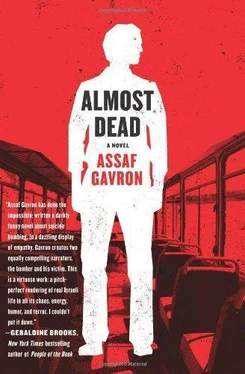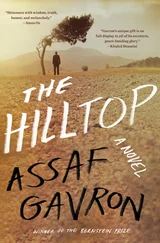I made tea. The flat was so cold I could see my breath steaming. Bilahl’s mobile rang: the theme from The A-Team . ‘Yes, Father…’ I heard him say, and I imagined Father with his silver mane at home in Murair and heard in Bilahl’s voice a reluctance to show disrespect. But Father and him…I remembered Father telling me, ‘I have no authority over him — I haven’t had for a while now. I’ve given up on him. But you…my heart aches for you, I know you’re not a murderer. I know you, Fahmi, no one knows you as I do.’ ‘Of course I’m not a murderer,’ I’d told him.
I put sugar in the tea and realised that Bilahl was now talking to someone else. The guy who’d checked Naji wasn’t sure about him. There was some sort of criminal mess in his past. Bilahl called Naji. How can anybody know what anyone has inside them?
In the operations apartment, I removed the belt from its hiding place in a wall closet, unwrapped the blankets and old newspapers, and laid it on the table. Lifted it up and felt it. The tubes with the explosives were in order: nothing had evaporated. I took the ball-bearings and nails from one of the pockets, where they surrounded a sausage of RDX, and then pulled out the sausage to show Bilahl. ‘We’ve got seven kilos of explosives and about ten kilos of iron here. This could create some damage.’
He nodded.
‘Do you want to try it?’ I said.
I didn’t mean that he should think of himself as a candidate to be Istishadi himself. But I saw that that was what he thought. He shut up for a moment and looked up from the explosive, focusing on nothing.
‘Let’s see how Naji gets on with it,’ he finally said.
Ali Jaafar Hussein’s café, the only one in Al-Amari, was around the corner. I asked for a Coke and drank it slowly, sitting on one of the small stools outside. We were the only ones out there. A drizzly wind lashed our faces and the puddles soaked our shoes. After a few minutes Naji arrived and Bilahl and I exchanged a look. He was so young his cheeks were still plump and smooth and when he spoke he lowered his eyes like a young bride.
‘ You’re sweating again. What are you thinking about there? ’
I’m thinking: when will you stop jabbering at me?
‘ Oh, Fahmi, did I tell you what a horrible night I had last night at home? ’
Did soldiers come and break your furniture, arrest your family, murder your mother? That kind of night, Svetlana?
The moment I put the belt on Naji I felt his body straining and his muscles tensing up. He bit his lips but didn’t say anything. ‘We’ve got to adjust the straps to your size. We need them tight so you can wear it under your shirt.’ Naji was chubby and fair skinned. I tightened the straps. He touched my hand, a soft touch, to indicate that the straps were tight enough. I was close to him. I could smell him — the raindrops on his neck, the fear.
‘This is the battery. You take it separately and connect it at the last minute. OK?’
He nodded.
‘Because from the moment you connect it, there’s an increased chance of an accident.’ To demonstrate, I disconnected the explosive from the electric circuit and connected a light bulb instead. I showed him how to connect the battery and he managed it after a few attempts. There was sweat on his brow. Bilahl went out to smoke, and when he returned I gave him a doubtful look. You have to be cooler than a cucumber in order to do something like this: you need frozen blood. You need to be a little crazy. I couldn’t understand why Naji had volunteered.
‘After the battery, the safety catch. This nail prevents you from pushing the button. You pull it out like this.’
He did it.
‘Now the button is free to push. Not too hard. It happens in the twinkling of an eye — the moment you push, you leave this life. You won’t feel anything. Not the explosion, no pain, nothing except the certainty that you are with God at last.’ Naji’s breathing got heavier. He laid a hand on my shoulder.
‘You will leave the life of suffering, the problems and the misery,’ Bilahl said. ‘A push of the button will send your soul to heaven, to God and to all the shuhada . You are going to God.’ Naji pressed his forehead to my shoulder. I extended a hand and hugged him. I gave Bilahl a look and nodded my head slightly. The boy breathed into my neck. ‘Push now,’ I whispered. He pushed. The bulb lit up for half a second and then there was a loud fizz-crack and it went out. Naji jumped in panic.
‘It’s nothing,’ I said casually. ‘The bulb went, that’s all.’
I went to get a new bulb. My hands were shaking so much I had to wait until they stopped. By the time I returned Naji had recovered. I changed the bulb and he tried again. This time he managed without my help. He took the belt off and laid it on the table. I went to the corner of the room and whispered in Bilahl’s ear.
After I dropped Shuli off at the King David my headache started. Like needles stabbing my brain. I stopped and bought a bottle of water. Looking over the stallholder’s shoulder, I asked for a Ta’ami chocolate bar, cigarettes and watermelon-flavoured chewing gum. I lit up a cigarette, though I don’t smoke. (I did once, in the army, but it would take up too much of my time now.) It didn’t stop the needles and made me feel nauseous. Two more puffs and I dumped the cigarette and the rest of the pack in a nearby bin. And the Ta’ami bar too, after a single bite. As I drove to my parents’ house I sipped the water and chewed the gum so fiercely that I almost dislocated my jaw.
My mother brought me some pills and made us a schnitzel. We tend to eat in silence, my parents and I. The English teacher of thirty years, the former peanut butter importer and the directory assistance integrated-solutions provider.
‘Shaar Hagai. That’s a real escalation,’ my father said after a while.
I nodded. Mother’s eyes were aching. She asked whether Duchi was all right. Good question. I was thinking about Shuli, wondering how she was coping in the kitchen. I wanted to drive there and ask her.
‘Duchi? She’s OK.’
I ought to have called her, but I couldn’t face the recriminations. The inevitable row. What for? Mother asked whether I’d had good meetings. Meetings? In Jerusalem, she meant. I told her they’d gone fine.
After the schnitzel, Danny Ronen’s eyebrows on Channel 2. Mother discovered a stain on the sofa and began obsessively trying to clean it up while grousing in the general direction of her husband, though no one but herself was listening.
‘The security forces,’ Ronen told us, ‘have conflicting evidence regarding the source of the terrorist cell that carried out the attack on the Jerusalem — Tel Aviv road, near Shaar Hagai. Initial evidence pointed to the village of Husan in the Bethlehem area, as reported yesterday. But today’s findings contradict this. In a communication accepting responsibility by the Izz ad-Din al-Qassam Brigades, “sons” are mentioned, as opposed to the single marksman that had previously been assumed. Furthermore, posters in memory of the suicide bomber nineteen-year-old Shafiq Omar throughout the West Bank refer to Ramallah as the source of the No. 5 bus attack, and not Nablus as was initially assumed. The security forces are unsure whether the posters and the messages are reliable or intended to confuse.’
‘Whatever the truth,’ said Danny Ronen, ‘the IDF Air Force carried out a “targeted assassination” this afternoon in the offices of the Islamic Charity Society in Al-Birah. As a result Halil Mahmoud Abu-Zeid, a senior Izz ad-Din al-Qassam Brigades member in Ramallah, thought to be responsible for the string of recent terrorist attacks — including Shaar Hagai, the Tel Aviv bus bombing, and the Sbarro restaurant on the Jaffa road in Jerusalem — was killed.’
Читать дальше












